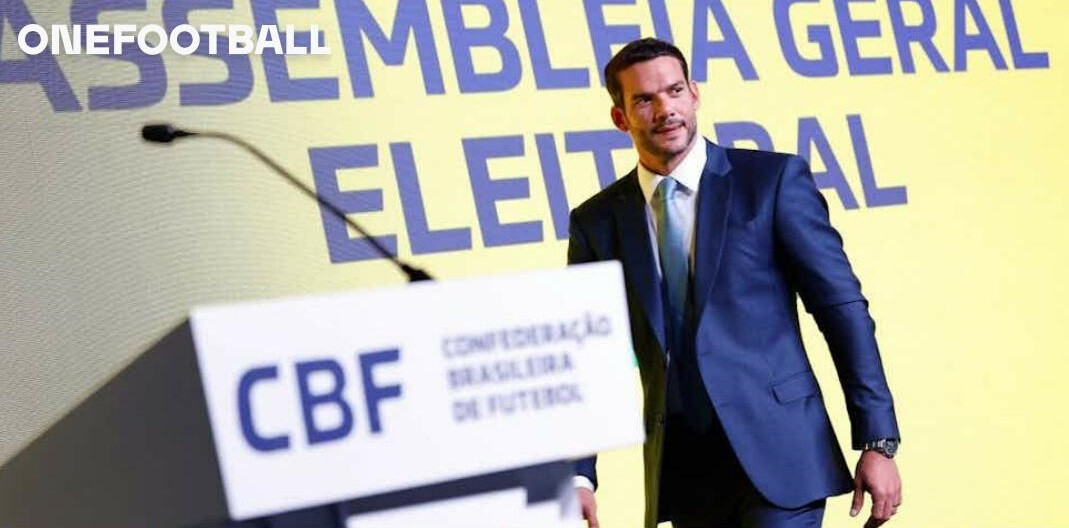
RIO DE JANEIRO, Brazil – In a tumultuous turn of events, the Brazilian Football Confederation (CBF) elected Samir Xaud as its new president on Sunday (local time), just days after the dismissal of the previous president and on the eve of Italian coaching maestro Carlo Ancelotti's arrival. The move signals an accelerated effort to revitalize the beleaguered 'Seleção,' the affectionate nickname for Brazil's national football team.
Xaud, a 41-year-old doctor with a reportedly limited background in football administration, ran unopposed to lead one of the world's most significant sports organizations. His election proceeded despite opposition and a boycott from approximately 20 clubs, including some of Brazil's most popular teams like Flamengo and Corinthians. Xaud's candidacy was a hasty decision following the abrupt dismissal of former president Ednaldo Rodrigues earlier this month.
Rodrigues, who had recently secured a contract with the then-Real Madrid coach Ancelotti, was removed by court order just days later, facing allegations of irregularities in the agreement that had confirmed his own reappointment as president.
"I will return Brazilian football to where it should never have left," Xaud pledged after being confirmed for a term until 2029 at a general assembly held at the CBF headquarters in Rio de Janeiro.
Xaud is the son of Zeca Xaud, a long-time head of the Roraima state football federation. He was originally slated to succeed his father as president of the Roraima federation but was quickly put forward as a candidate for the CBF presidency.
Club Discontent and Election System Controversy
The new president, Xaud, garnered support from 25 of the 27 state federations and about 10 clubs from the first and second divisions, including Palmeiras, Vasco da Gama, Grêmio, and Botafogo.
However, 21 clubs, including Corinthians, Fluminense, Cruzeiro, Internacional, Santos, and São Paulo, contested the election, demanding reforms to the electoral system that would grant more power to the clubs compared to the federations.
Currently, the CBF's statutes assign a value of 3 points to the votes of each state federation, 2 points to first-division clubs, and 1 point to second-division clubs. This system has been criticized for allowing a president to be elected without the backing of a majority of the teams. This structure, which heavily favors the influence of a minority of federations, has exacerbated the dissatisfaction of popular clubs, who are the true protagonists of Brazilian football. As a result, the CBF has consistently been plagued by internal conflicts and power struggles, which many argue contribute to the overall instability of Brazilian football.
The Future of Brazilian Football Rests on Ancelotti's Shoulders
Xaud's immediate task will be to welcome Ancelotti, who is scheduled to arrive in Brazil on Monday (local time). Ancelotti is set to begin his first official duties as coach of the five-star Brazilian national team by announcing the squad for the June World Cup qualifiers against Ecuador and Paraguay. Ancelotti's arrival in Brazil was scheduled for Sunday night.
President Xaud expressed his hopes, stating, "May the Christ the Redeemer statue bless the arrival and journey of our 'Mister' Carlo Ancelotti, so that he may achieve the long-desired sixth World Cup title."
The 65-year-old Ancelotti succeeds Dorival Júnior as Brazil's coach, who was dismissed after a humiliating 1-4 defeat to Argentina in a World Cup qualifier in March.
That defeat in Buenos Aires further frustrated fans who have been disappointed by the team's poor performance and the absence of past idols like Pelé, Garrincha, Ronaldo, Romário, and Ronaldinho. Since their last World Cup triumph in 2002, the Brazilian national team has only reached the semi-finals once in the last five World Cups, suffering a shocking and historic 1-7 defeat to Germany on home soil in the 2014 World Cup. This raised fundamental questions about Brazil's standing in world football. Once hailed as the "Kingdom of Football" and dominating the global stage, Brazil is now making desperate efforts to reclaim its past glory.
Xaud's Key Pledges and Challenges
Xaud also pledged to work towards financial fair play in Brazilian football, revitalize women's football competitions, combat racism, and "make the Brazilian people one with the Seleção again."
He assumes office after former president Rodrigues abandoned his legal battle to return to the CBF presidency in the Supreme Court this week. A Rio de Janeiro court had ordered Rodrigues' dismissal on May 15, declaring that a January agreement confirming his reappointment as president was invalid due to alleged forgery of another executive's signature.
The election of the new CBF president and the acquisition of Ancelotti are poised to be a turning point for Brazilian football. President Xaud's leadership and Ancelotti's tactical prowess will be tested as they strive to mend internal conflicts, elevate the national team's performance, and restore its past glory. Brazilian football fans earnestly hope that they can lead the "Football Kingdom" back to its rightful place.
[Copyright (c) Global Economic Times. All Rights Reserved.]



























